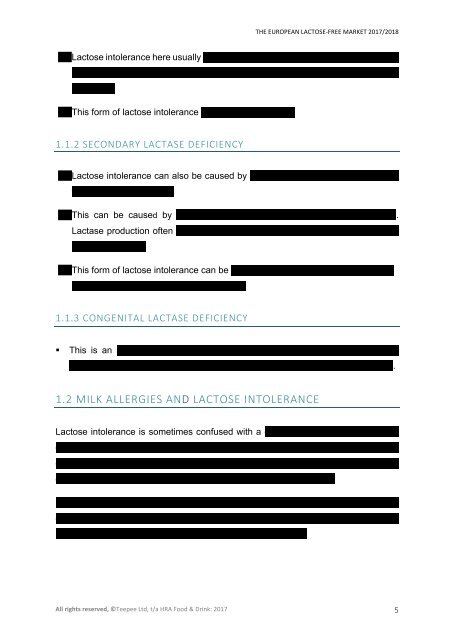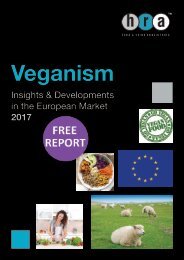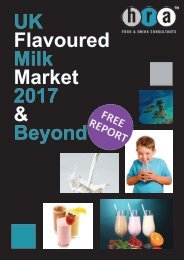European Lactose-Free Market Report 2017/2018 Report
Dying to know what’s going on in the hottest Free From category? Looking for something different to those tedious reports filled with nothing but data and no insight? Looking for detailed category analysis from experienced specialists to give your brand the ‘Edge’?
Dying to know what’s going on in the hottest Free From category?
Looking for something different to those tedious reports filled with nothing but data and no insight?
Looking for detailed category analysis from experienced specialists to give your brand the ‘Edge’?
You also want an ePaper? Increase the reach of your titles
YUMPU automatically turns print PDFs into web optimized ePapers that Google loves.
THE EUROPEAN LACTOSE-FREE MARKET <strong>2017</strong>/<strong>2018</strong><br />
§ <strong>Lactose</strong> intolerance here usually occurs in late childhood, when an infant becomes<br />
less dependent on milk products. This intolerance may not emerge until early<br />
adulthood.<br />
§ This form of lactose intolerance tends to be permanent.<br />
1.1.2 SECONDARY LACTASE DEFICIENCY<br />
§ <strong>Lactose</strong> intolerance can also be caused by damage to the gut, which decreases<br />
the production of lactase.<br />
§ This can be caused by surgery, a medical condition or certain medications.<br />
Lactase production often decreases with age, so lactose intolerance sometimes<br />
occurs later in life.<br />
§ This form of lactose intolerance can be temporary until the gut heals, but can be<br />
long-term if cause by an ongoing condition.<br />
1.1.3 CONGENITAL LACTASE DEFICIENCY<br />
§ This is an uncommon genetic condition which means newborn infants cannot<br />
digest lactose. <strong>Lactose</strong>-free infant formulas are available in these circumstances.<br />
1.2 MILK ALLERGIES AND LACTOSE INTOLERANCE<br />
<strong>Lactose</strong> intolerance is sometimes confused with a cows’ milk allergy. A milk allergy<br />
occurs when the immune system reacts negatively to proteins found in cows’ milk,<br />
creating antibodies. This can be a serious condition, with symptoms ranging from<br />
digestive issues much like lactose intolerance, to anaphylactic shock.<br />
People suffering from a cow’s milk allergy are advised to avoid all foods containing<br />
dairy. However, those suffering from lactose-intolerance can still consume dairy as<br />
long as it is lactose-free, or contains very low levels of lactose.<br />
All rights reserved, ©Teepee Ltd, t/a HRA Food & Drink: <strong>2017</strong> 5







